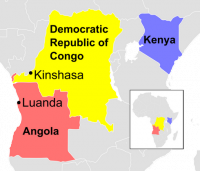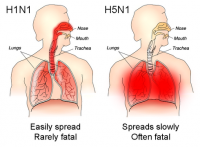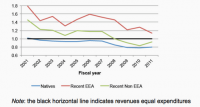-
Assessing the risk from Africa as Libya loses its chemical weapons
Libya’s remaining chemical weapons left over from the Gaddafi regime are now being safely disposed of in a German facility. This eliminates the risk of them falling into the wrong hands. But can these same hands acquire weapons of mass destruction from the rest of Africa? The disposal of Libya’s chemical weapons has lowered the risk of weapons of mass destruction in Africa. But we have seen how far non-state actors are willing to go to either produce or steal such weapons. For example, analysts envision militants known as “suicide infectors” visiting an area with an infectious disease outbreak like Ebola purposely to infect themselves and then using air travel to carry out the attack. Reports from 2009 show forty al-Qaeda linked militants being killed by the plague at a training camp in Algeria. There were claims that they were developing the disease as a weapon. The threat WMD pose cannot be ignored. African countries, with help from bilateral partners and the international community, have broadened their nonproliferation focus. They will need to keep doing so if the goal is effectively to counter this threat.
-
-
UN releases follow-up to report on the mysterious death of former UN chief Hammarskjöld
UN secretary-general Ban Ki-moon the other day released a follow-up note to the 2015 report of an Independent Panel of Experts that was established to examine and assess new information regarding the 1961 death of former UN secretary-general Dag Hammarskjöld. Hammarskjöld’s plane crashed in September 1961 near Ndola, in what was then the British colony of Northern Rhodesia, and is now Zambia. He was on his way t negotiate an end to the war between Congo, which was supported by the Soviet Union, and the breakaway, mining-rich region of Katanga, which was supported by Belgium (openly) and the United States (covertly).The UN is especially frustrated with the United Kingdom for not releasing more intelligence documents which would shed light on the question of whether Hammarskjöld’s plane was brought down by Western intelligence services who wanted Katanga to remain independent of Congo.
-
-
Boko Haram leader “fatally wounded in army air strike”: Nigeria
Nigeria claims to have “fatally wounded” Abubakar Shekau, the leader of Boko Haram, in an air strike targeting a meeting of the commanders of the Islamist group. The Nigerian military says that Shekau and other senior leaders of the group gathered for prayers on Friday, and that they were hit by an “air force raid.”
-
-
Yellow Fever outbreak on verge of going global, with vaccine supply running short

The largest Yellow Fever epidemic for decades is now sweeping the Democratic Republic of Congo and Angola and could soon spread to the Americas, Asia, and Europe. The outbreak has all but emptied global emergency stocks of vaccine. There are only seven million emergency vaccines available for the current vaccination campaign — too few to even fully cover the city of Kinshasa, let alone the whole of the DRC.
-
-
Togo organizing Israeli-African security and development summit
The West African nation of Togo is taking the lead in organizing an Israeli-African “security and development” summit, which it offered to host in its capital next year. Israel has a long history of sharing its economic and security expertise with countries on the continent, and Jerusalem hopes that increased ties with African nations will lead to a shift in their voting trends at the UN and other global for a. Israel’s relations with many African countries were disrupted by Israeli-Palestinian tensions, but African countries which had severed diplomatic relations with Israel in the early 1970s are now resuming relations. Last month, the Muslim-majority Republic of Guinea restored diplomatic ties with Israel after a 49-year break.
-
-
Food crisis in northeast Nigeria drives youth to radicalize, join Boko Haram: UN
Urgent action is needed to provide farming and livelihood support to 385,000 people in parts of Nigeria’s northeast where food insecurity is rampant, the UN Food and Agriculture Organization (FAO) said. The UN agency noted that more than three million people are affected by acute food insecurity in Borno, Yobe, and Adamawa States. Failure to rebuild the rural economy will translate into lack of employment opportunities with possible harmful consequences including youth radicalization and enrolment into armed groups, resulting in continued civil unrest.
-
-
UN urges heightened vigilance after H5N1 outbreaks in West and Central Africa

The United Nations Food and Agricultural Organization (FAO) alerted Western and Central African governments to be vigilant, and to continue their raised surveillance and prevention efforts after H5N1 avian influenza outbreaks were recently confirmed in chicken farms in Cameroon. The UN notes that the recent outbreak in Cameroon has brought the number of countries that have battled bird flu in West and Central Africa to six, also including Burkina Faso, Cote d’Ivoire, Ghana, Niger, and Nigeria.
-
-
New control strategies needed for Zika, other unexpected mosquito-borne outbreaks
A recent spate of unexpected mosquito-borne disease outbreaks — most recently the Zika virus, which has swept through parts of the Americas — have highlighted the need to better understand the development and spread of little-known diseases and for new strategies to control them, researchers say. They say that despite the discovery of Zika in Uganda in 1947 and the identification of the first confirmed human infection in Nigeria six years later, few cases were reported in humans until 2007. Even then, no one understood the grave risk the disease posed to pregnancies until the recent outbreak in Brazil, which began less than two years ago.
-
-
Lessons of 1976 Ebola outbreak analysis are relevant today
With the recent Ebola epidemic in West Africa reviving interest in the first outbreak of the deadly hemorrhagic fever 40 years ago, scientists have released a report highlighting lessons learned from the smaller, more quickly contained 1976 outbreak. “Key to diagnosis in 1976 was the relatively quick clinical recognition of a severe, possibly new disease by national authorities,” according to one of the researchers.
-
-
Refugees can offer economic boost to host countries

Refugees are often considered an economic burden for the countries that take them in, but a new study indicates that refugees receiving aid — especially in the form of cash — can give their host country’s economy a substantial boost. The researchers found that these economic benefits significantly exceeded the amount of the donated aid. The findings come as refugee numbers around the world are growing.
-
-
More mass killings, violent repression in Africa as Islamist groups expand operations
Africa dominates the list of states that have risen most prominently in the Peoples Under Threat index this year as conflicts involving Boko Haram, al-Qaeda, and ISIS-affiliated forces affect more states, while numerous old conflicts are reactivated. While a significant rise in the Peoples under Threat index provides early indication of risk in the future, the mass killing of civilians is already under way in the African states at the top of the index.
-
-
Nigeria has failed to stamp out Boko Haram in Buhari’s first year in power

When Muhammadu Buhari — a former general and, for a year-and-a-half in the early 1980s, the military ruler of Ngeria — was sworn in as Nigeria’s president on 29 May 2015, he promised to “stamp out” Boko Haram within twelve months. Security analysts note that despite some progress, he has failed to do so. Critics of Buhari say that while Boko Haram has been pushed back and has lost large swaths of territory it used to control, Buhari’s heavy-handed approach to unrest or dissent of any kind in Nigeria has created more problems.
-
-
Claims of mistreatment of Mau Mau rebels “cannot be fairly tried”: U.K. government
The British government told a court in London that claims from 40,000 Kenyans that they were beaten, raped, and mistreated during the British campaign against the Mau Mau rebellion cannot be fairly tried sixty years later. Responding to a lawsuit which opened at the high court in London this week, and which is expected to go on continue for more than a year, Guy Mansfield QC, representing the Foreign Office, said those accused of having inflicted the violence are now dead or untraceable.
-
-
Frequency of extreme heat waves on the increase in Africa -- could soon occur annually

Climate analysis shows that periods of unusually hot weather are on the rise for one of the most vulnerable continents to climate change, even if the increase in global average temperature remains at a modest level.Longer, hotter, more regular heat waves could have a damaging effect on life expectancy and crop production in Africa warn climate say scientists.
-
-
Nigerian military accused of covering up mass killing of civilians
Mass killing of hundreds of men, women, and children by soldiers in Zaria and the attempted cover-up of this killing demonstrates a contempt for human life and accountability, said Amnesty International as it publishes evidence gathered on the ground showing how the Nigerian military burned people alive, razed buildings, and dumped victims’ bodies in mass graves.
-
- All
- Regional
- Water
- Biometrics
- Borders/Immig
- Business
- Cybersecurity
- Detection
- Disasters
- Government
- Infrastructure
- International
- Public health
- Public Safety
- Communication interoperabillity
- Emergency services
- Emergency medical services
- Fire
- First response
- IEDs
- Law Enforcement
- Law Enforcement Technology
- Military technology
- Nonlethal weapons
- Nuclear weapons
- Personal protection equipment
- Police
- Notification /alert systems
- Situational awareness
- Weapons systems
- Sci-Tech
- Sector Reports
- Surveillance
- Transportation
Advertising & Marketing: advertise@newswirepubs.com
Editorial: editor@newswirepubs.com
General: info@newswirepubs.com
2010-2011 © News Wire Publications, LLC News Wire Publications, LLC
220 Old Country Road | Suite 200 | Mineola | New York | 11501
Permissions and Policies
Editorial: editor@newswirepubs.com
General: info@newswirepubs.com
2010-2011 © News Wire Publications, LLC News Wire Publications, LLC
220 Old Country Road | Suite 200 | Mineola | New York | 11501
Permissions and Policies
